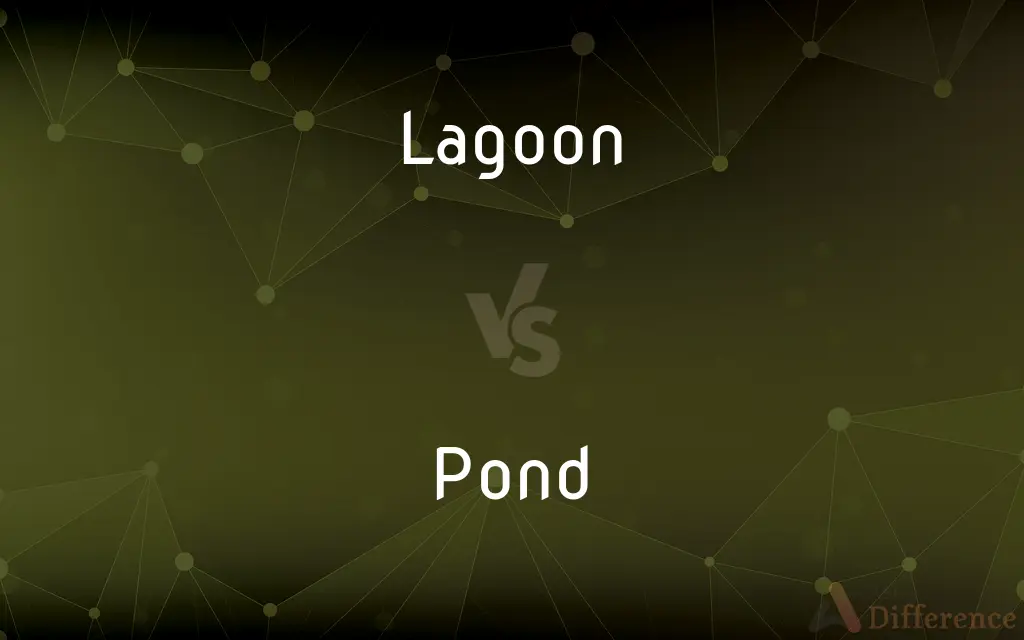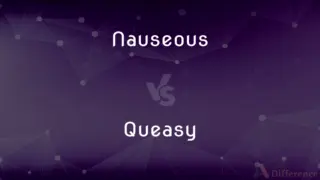Lagoon vs. Pond — What's the Difference?
By Tayyaba Rehman & Urooj Arif — Updated on March 30, 2024
A lagoon is a shallow body of water separated from larger bodies by barriers, typically connected to the sea, whereas a pond is a small, enclosed body of freshwater, often man-made or naturally occurring in landlocked areas.

Difference Between Lagoon and Pond
Table of Contents
ADVERTISEMENT
Key Differences
Lagoons are typically found along coastal areas, formed by natural barriers like sandbars, coral reefs, or spits that separate them from larger bodies of water, often the sea. They can be either saltwater or brackish. Ponds, on the other hand, are small, freshwater bodies that are found inland and can be either natural or artificial. They are characterized by their quiet waters and the ability to support aquatic plants and animals.
While lagoons are influenced by the sea's tidal movements, leading to changes in water level and salinity, ponds remain relatively stable in terms of water level and salinity, providing a consistent environment for their ecosystems. Lagoons often serve as habitats for a diverse range of marine life, including fish, birds, and crustaceans, which thrive in their varying salinity levels. Ponds support freshwater species such as fish, amphibians, and waterfowl, with a vegetation-rich environment that is less influenced by salinity changes.
The formation of lagoons is primarily due to coastal processes and the presence of protective barriers that create a semi-enclosed area. In contrast, ponds can form through a variety of processes, including glacial activity, volcanic activity, or even human excavation. This difference in formation leads to a distinct difference in their ecosystems and the types of life they support.
Lagoons can be large and dynamic, with their sizes and shapes changing over time due to natural forces like storms and currents. Ponds are generally smaller and more stable, with their boundaries defined by the land that encloses them. The management and conservation of these water bodies also differ, with lagoons often requiring efforts to protect their coastal barriers and marine life, while ponds may need management to maintain water quality and control invasive species.
Comparison Chart
Water Type
Saltwater or brackish
Freshwater
ADVERTISEMENT
Location
Coastal areas
Inland
Formation
Natural barriers separating from larger bodies
Natural occurrences or artificial creation
Tidal Influence
Yes, often affected by tides
No, not typically influenced by tides
Ecosystem
Marine life, varying salinity
Freshwater life, stable environment
Size
Can be quite large
Generally small
Salinity Changes
Yes, due to connection with the sea
Minimal to none
Habitat
Fish, birds, crustaceans
Fish, amphibians, waterfowl
Stability
Dynamic, changes over time
Stable, consistent environment
Conservation Needs
Protecting barriers, marine life
Maintaining water quality, controlling invasive species
Compare with Definitions
Lagoon
Often affected by tidal movements.
The lagoon fills and empties with the rise and fall of the sea.
Pond
A small body of still freshwater, natural or artificial.
We have a small fish pond in our backyard.
Lagoon
Can have varying salinity due to its connection to the sea.
The coastal lagoon's salinity changes with the tides.
Pond
Generally stable in terms of salinity and water level.
The pond's water level stays consistent throughout the year.
Lagoon
A shallow body of water separated from the sea by sandbars, reefs, or spits.
The lagoon is a haven for migratory birds.
Pond
Not influenced by tidal movements.
The secluded pond remains calm, unaffected by the sea's tides.
Lagoon
Subject to dynamic environmental changes.
Storms can significantly alter the lagoon's landscape.
Pond
Supports freshwater flora and fauna.
The pond is teeming with frogs and lilies.
Lagoon
Supports diverse marine ecosystems.
Coral reefs in lagoons are biodiversity hotspots.
Pond
Can be a habitat for various species.
Ducks and geese frequently visit our local pond.
Lagoon
A lagoon is a shallow body of water separated from a larger body of water by a narrow landform, such as reefs, barrier islands, barrier peninsulas, or isthmuses. Lagoons are commonly divided into coastal lagoons and atoll lagoons.
Pond
A pond is an area filled with water, either natural or artificial, that is smaller than a lake. Ponds can be created by a wide variety of natural processes (e.g.
Lagoon
A shallow body of water, especially one separated from a sea by sandbars or coral reefs.
Pond
A still body of water smaller than a lake.
Lagoon
A shallow artificial pond used for treating or storing liquid waste material or for collecting flood waters.
Pond
To form ponds or large puddles
Debris blocked the culvert, and the stream began to pond.
Lagoon
A shallow body of water separated from deeper sea by a bar.
Pond
To cause to form ponds or large puddles
The landslide ponded the stream.
Lagoon
A shallow sound, channel, pond, or lake, especially one into which the sea flows; as, the lagoons of Venice.
Pond
To form ponds or large puddles on (a piece of land).
Lagoon
A lake in a coral island, often occupying a large portion of its area, and usually communicating with the sea. See Atoll.
Pond
An inland body of standing water, either natural or man-made, that is smaller than a lake.
Lagoon
A body of water cut off from a larger body by a reef of sand or coral
Pond
An inland body of standing water of any size that is fed by springs rather than by a river.
Pond
(colloquial) The Atlantic Ocean. Especially in across the pond.
I wonder how they do this on the other side of the pond.
I haven't been back home across the pond in twenty years.
Pond
(transitive) To block the flow of water so that it can escape only through evaporation or seepage; to dam.
Pond
(transitive) To make into a pond; to collect, as water, in a pond by damming.
Pond
(intransitive) To form a pond; to pool.
Pond
To ponder.
Pond
A body of water, naturally or artificially confined, and usually of less extent than a lake.
Pond
To make into a pond; to collect, as water, in a pond by damming.
Pond
To ponder.
Pleaseth you, pond your suppliant's plaint.
Pond
A small lake;
The pond was too small for sailing
Common Curiosities
How do lagoons and ponds differ in salinity?
Lagoons can have varying salinity levels due to their connection with the sea, while ponds typically have stable, freshwater conditions.
Can ponds support marine life?
Ponds support freshwater life, not marine species, due to their freshwater environment.
What is the significance of ponds in an ecosystem?
Ponds play a crucial role in supporting freshwater biodiversity and serving as habitats for various species.
Are lagoons influenced by tides?
Yes, lagoons are often influenced by tidal movements, affecting their water levels and salinity.
Are all ponds small in size?
While ponds are generally small, their size can vary, and some may be quite large, depending on how they are defined regionally.
What defines a lagoon?
A lagoon is a shallow body of water, often saltwater or brackish, separated from larger bodies like the sea by natural barriers.
What defines a pond?
A pond is a small, enclosed body of freshwater, either naturally occurring or artificially created, found inland.
What types of ecosystems can be found in lagoons?
Lagoons can support diverse ecosystems, including fish, birds, and crustaceans, depending on their salinity levels.
What conservation efforts are needed for lagoons?
Lagoons may require efforts to protect their natural barriers and marine life from environmental threats.
Do lagoons have fresh water?
Lagoons can have brackish or saltwater, but some lagoons, especially those not directly connected to the sea, may have fresher water.
How are ponds formed?
Ponds can be formed by natural processes such as glacial activity or volcanic craters, or they can be man-made.
How does human activity impact ponds and lagoons?
Human activity can significantly impact both, from pollution and habitat destruction in lagoons to eutrophication and invasive species in ponds.
What role do barriers play in the formation of lagoons?
Barriers like coral reefs, sandbars, and spits are crucial in separating lagoons from larger water bodies, forming their distinct environment.
Can lagoons be found away from coastal areas?
While most lagoons are coastal, certain types of lagoons can also be found inland, depending on the geological and hydrological conditions.
How can the conservation of ponds and lagoons benefit local communities?
Conservation can enhance water quality, preserve biodiversity, and provide recreational and educational opportunities, benefiting local communities environmentally and economically.
Share Your Discovery

Previous Comparison
Nauseous vs. Queasy
Next Comparison
Gook vs. ChinkAuthor Spotlight
Written by
Tayyaba RehmanTayyaba Rehman is a distinguished writer, currently serving as a primary contributor to askdifference.com. As a researcher in semantics and etymology, Tayyaba's passion for the complexity of languages and their distinctions has found a perfect home on the platform. Tayyaba delves into the intricacies of language, distinguishing between commonly confused words and phrases, thereby providing clarity for readers worldwide.
Co-written by
Urooj ArifUrooj is a skilled content writer at Ask Difference, known for her exceptional ability to simplify complex topics into engaging and informative content. With a passion for research and a flair for clear, concise writing, she consistently delivers articles that resonate with our diverse audience.
















































